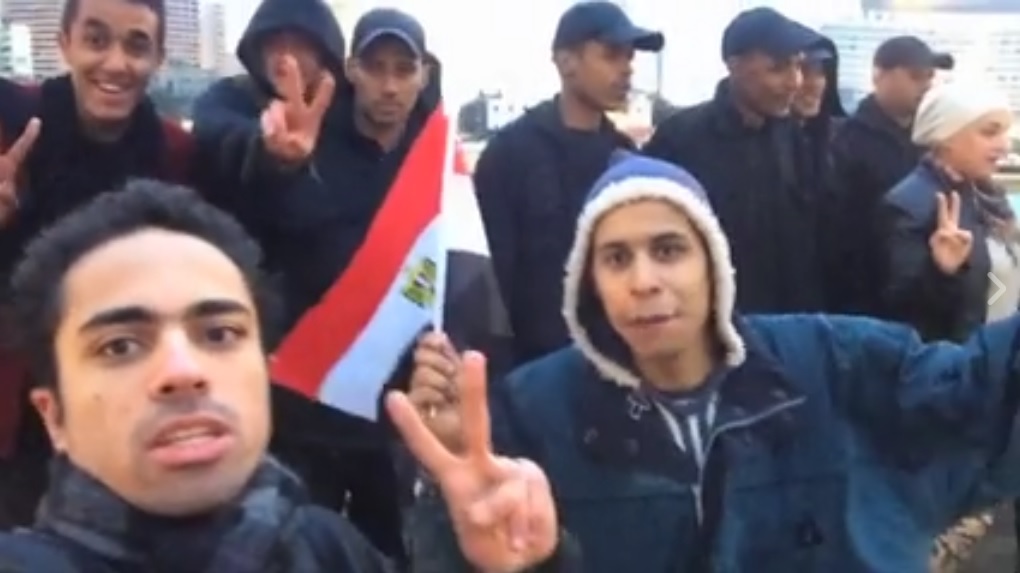On the fifth anniversary of the January 25th revolution, there was little anticipation for any visible forms of disgruntlement in Egypt. Given the protest law that prohibits any demonstrations without interior ministry consent and the already incessant crackdown on government opposition, the slightest form of opposition on the day would have been met with severe force.
There have been allegations of abductions, unlawful imprisonment and torture made towards the interior ministry. Egypt’s criminal procedures law states that a detainee facing accusations that could lead to life imprisonment or the death penalty can only stay in prison for a maximum of two years if not yet charged. Yet, according to Amnesty International, there have been over 700 detainees held without trials for over two years.
Therefore, it is safe to assume that security forces were well-prepared for the day. However, there was one thing they could not dispel on the fifth anniversary of the revolution: Satire.
In a widely circulated video, Egyptian satirist Shady Hussein and prominent young actor Ahmed Malek went to Tahrir Square, which was densely populated with police forces on the revolution’s anniversary. Masquerading as ardent supporters of the police, the duo passed around condoms that appeared to be balloons to unsuspecting police officers and celebrated with other Egyptians commemorating the national police day, which is on the same day as the revolution.
The aftermath of the video was chaotic. Many criticized it, highlighting its “lack of morality” and its “exploitation” of the police offers who are only following orders. Others said it was the only form of opposition left, given heightened crackdown by the government. Malek has come out and apologized for the incident, stating it was a miscalculated decision, whereas Hussein refused to do the same, holding that what he did was nothing compared to what the police do on a daily basis. Egypt’s Actors’ Syndicate suspended Malek, while “Abla Fahita” – a comedy show which Hussein worked for – issued a statement saying he was not representative of the show.
There are obviously many conflicting views in regards to the video itself but its aftermath does shed light into the double standards of many Egyptians.
The reaction from mainstream entities has been mostly critical and toes the line of slander towards Hussein and Malek. Controversial media personality Ahmed Moussa accused the duo of being “agents of Mohamed El Baradei” and claimed that they were plotting for the downfall of the police – statements he failed to back up with any credible source. Actor Hassan Youssef threatened to quit the Actors’ Syndicate if Malek was not permanently expelled from the syndicate.
Taking things to an extreme level, television presenter Sayed Ali threatened Malek and Hussein, saying that if it weren’t for the police officers they ridiculed, they would have found condoms lying next to their mothers left behind by ISIS members. Another television presenter, Mohamed El Gheity, accused Hussein of being a homosexual and hinted that he needs to be captured and assaulted.
It is not difficult to highlight the blatant hypocrisy in their statements. While criticizing the inappropriateness of the video and its unethical content, they seem to have no problem baselessly accusing people of being traitors and homosexuals and calling for their assault. Additionally, some of them don’t see anything inappropriate in hinting at their mothers being raped by ISIS members. Ali has since apologized for his statements yet it is unlikely that he will be facing the same sort of backlash faced by Malek and Hussein.
Given the conservative nature of many Egyptians, it is natural for them to be offended at the video. But those offended need to ask themselves whether a juvenile prank towards police officers is worse than slander and direct threats.
In reality, this sort of statements by these “journalists” has become a norm that many Egyptians turn a blind eye to. For example, lawyer and Member of Parliament Mortada Mansour, infamous for his profanity on television, is a recurring guest on many Egyptian talk shows. He constantly uses language and discourse that is far worse than what was on the video, yet is one of the most on-demand guests in Egyptian television.
This dichotomy is not surprising, as the source of frustrations from many of these individuals is politically, rather than morally, motivated. For example, when popular satirist Bassem Youssef used various “sexual and inappropriate” innuendos to criticize the Muslim Brotherhood, virtually no one from the mainstream media seemed to give it any mind. However, when Youssef attempted to do the same following the Brotherhood’s ouster, the moral outcries started to appear. Today, Youssef has had his popular show cancelled and is afraid of returning to the country in face of arrest.
It is because of this that one wonders if the victims of the video were an entity other than the police, if the barrage of media personalities bashing the video would have appeared at all. It is probable – Bassem Youssef’s case as an example – that if the victims were someone whom the media’s discourse is against, they would have supported it.
Additionally, it is important to note that legally, Malek and Hussein did nothing wrong – yet they still face the possibility of going to court, as it is still unclear whether or not they will face charges.
Yet what is clear is that it is everyone’s right to voice their opinion on the video. However, it is the slanderous, unaccountable and baseless accusations in which the moral dilemma occurs. It is not because of a prank video that was made by two individuals who see few other venues through which to express their discontent but by a media that is selective, hypocritical and fallacious in its so-called moral uproars.
Shady Hussein and Ahmed Malek should not face charges, nor should they have their careers ruined. It is those who continuously spread false news and accusations, at times being immoral themselves, who should face punishment. Yet, this is extremely unlikely. Instead, Egyptian mainstream media today is a petty, politically exploitative playground in which unprofessional and unqualified individuals find themselves reaching millions of people. Within a certain political framework, they are allowed to slander and defame – get paid for it.







Comment (1)
[…] critical societal issues, and offer dissenting voices a platform. Even preceding 2011, which triggered a surge of Facebook satire, a noteworthy display of satire could be observed in political cartoons. Published in many […]